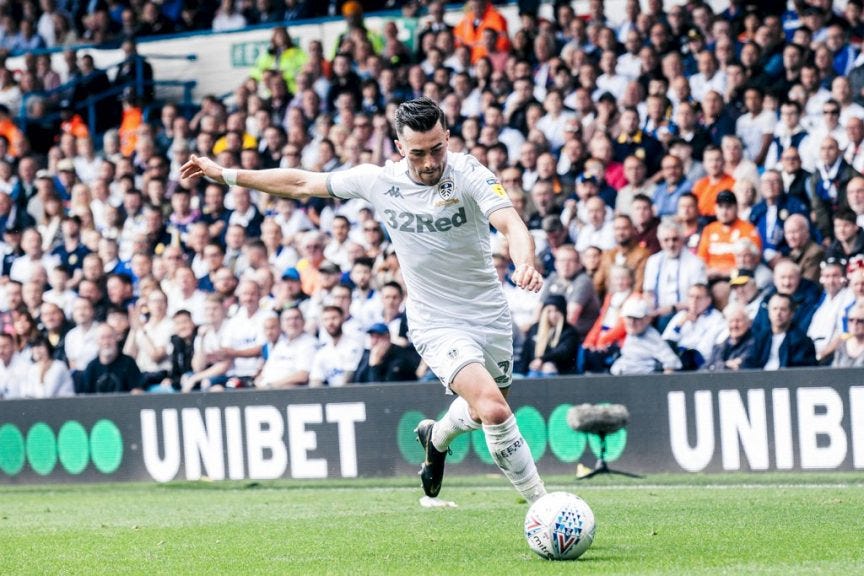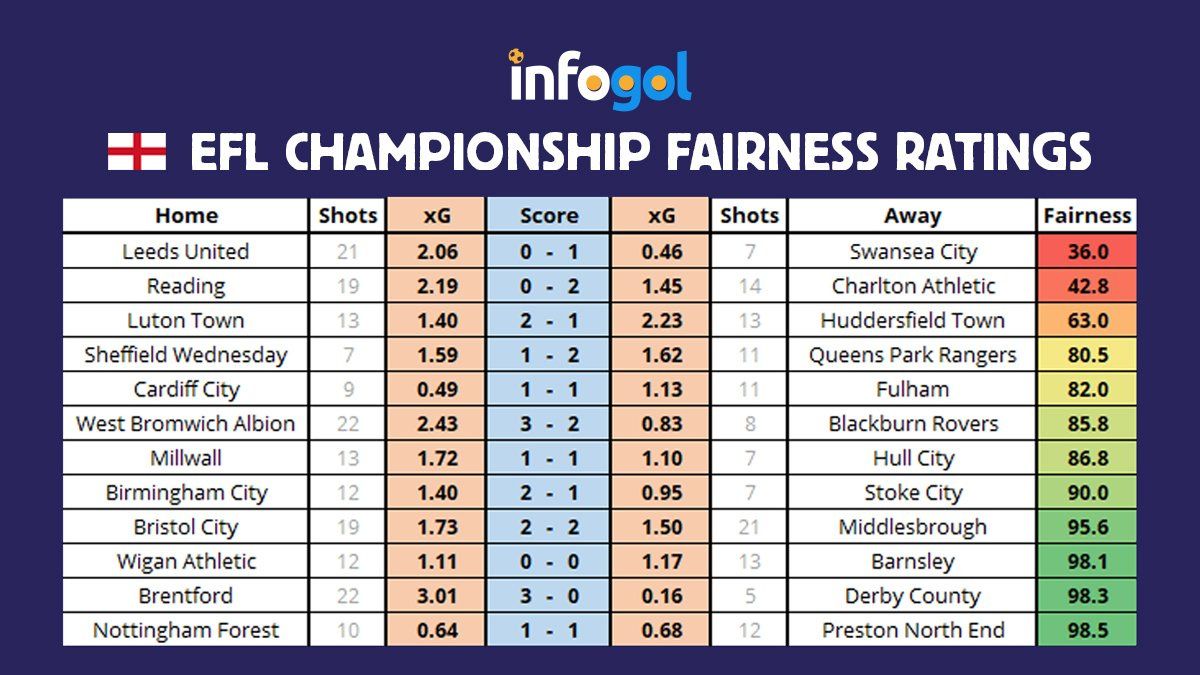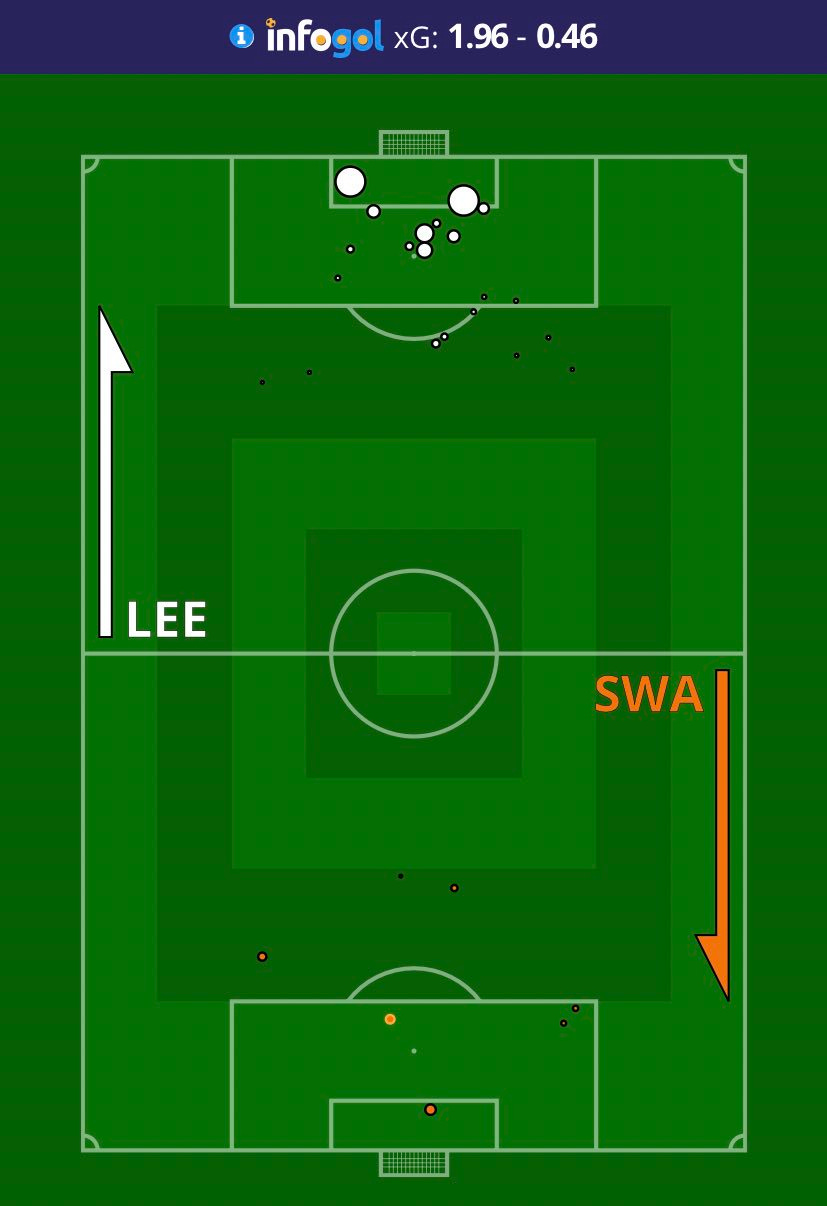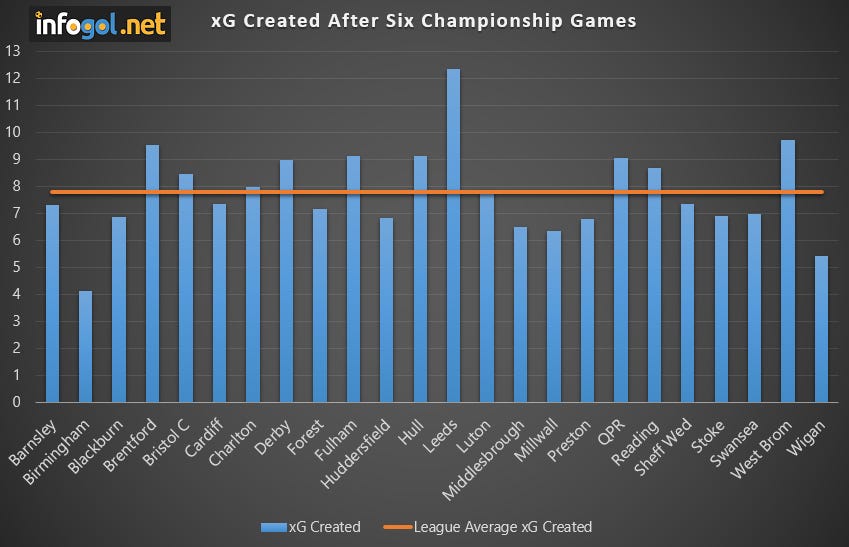
A few thoughts after #lufc’s defeat at the hands of Swansea City [thread]:
Having had family commitments this weekend—and being an exemplary family member—I didn’t watch the game live (short of twenty minutes at the beginning).
It was fascinating having experienced all of the aftermath of social media in the wake of the game and then coming to it a couple of days later.
Rewatching the game and expecting it to be a shitshow—or at least less convincing than our other games—I can now confirm to you all: everything is going to be okay. We were good.
We have heard a lot of ‘Well, when the league is decided by xG, then let us know what the stats tell us’ and ‘The game doesn’t care about stats’. Sure, but that doesn’t stop this from being a [cliche klaxon] ‘smash and grab’.
According to Infogol (@InfogolApp), the game itself was the least fair out of any of the games from the Championship:

Leeds’ 2.06 to Swansea’s 0.46 should have been enough to expect Leeds to win the majority of the time.
When you break down those figures per chances, you can see that Leeds created much more dangerous chances than their opponents:

There’s no two ways about it: Leeds were unlucky. Yes, football is highly stochastic and will always involve injustices. But few of them will be of this magnitude.
Swansea continue to be lucky, then, as we suggested in our preview.
Ben Mayhew’s (@experimental361) Expected Goals table confirms it. Swansea are currently 17 places higher than what you would expect based on their output so far, having 10 undeserved points to their name.

That’s the bitterness out of the way. How did Swansea manage to pull off this heist?
Well, according to their manager, Steve Cooper, by exploiting ‘obvious’ weaknesses in Leeds’ tactics:


To take these comments on face value, it’s true that Cooper did set up this way and there were glimpses of tactical insight in what his team did. But to make the leap that he seems to make between his tactical approach and the win is perhaps stretching it.
He mentions Mike van der Hoorn’s maurinding runs: there were two in the first half—one saw him flight the ball out to Jake Bidwell, who failed to control it—one saw him win a free kick in a dangerous area from which Bersant Celina hit the wall.
There was a period in which Swansea’s full-backs pushed up the pitch just after Sam Surridge was brought on for Borja Baston but this was short-lived:
[Leeds are top of this plot]

The SofaScore momentum chart shows this to be the only time Swansea looked dangerous apart from their goal.
The goal itself came from a corner.
In short, Cooper’s team may have enacted his tactics but these tactics were barely efficient and the win itself was as dependent on Leeds managing to squander chances. But that’s, as they say, football.
Smash. And. Grab.
The annoying thing about Cooper’s comments is that there was very little in the way of tactical innovation from him at all. When the double substitution was made around the 63rd minute, both were like-for-like and nothing changed beyond Surridge looking a little more energetic and stretching Leeds’ defence more than Borja Baston did.
Swansea set up in their 4-2-3-1 as we predicted:

Defensively, they adopted a mid-block in the main, although they did press high with certain triggers (such as when a Leeds player received the ball with their back to goal in a wide area):

Given that Leeds dominated the possession (61% to 39%), this meant the Swansea full-backs failed to push forward very often. As a result, Swansea’s transitions—which are already slow—became even more stultified:

With Bidwell monitoring Hernandez and Roberts being pushed deeper by Harrison and Alioski, Swansea’s only transitional outlet was, as Cooper mentioned, Mike van der Hoorn, who pushed into the space in front of him and looked to upset the Leeds United press:

From there, Swansea looked to work the ball out to the wide players, who were more often than not isolated.
Given this was not working, Cooper switched Baston for the more athletic Surridge who was able to link up with the wide forwards and push the Leeds defence more than his teammate was.
Neither tactic was particularly dangerous: Swansea managed one shot on target in either half.
From Leeds’ perspective, the big question tactically was: Alioski or Douglas?
In the first half, Bielsa went with Alioski and the reason was obvious enough—if van der Hoorn is pushing forward and Swansea attack through their full-backs, you want the corresponding full-back to be the more direct:

Unsurprisingly, Alioski had a couple of decent chances in the first half from precisely this sort of movement into the box.
In the second half, van der Hoorn sat a little deeper—as did his team (possession in the second half was 65% to 35% in Leeds favour—so Bielsa brought on Douglas: a player better suited to the sort of support play that Harrison thrives on.
With Leeds in the ascendency, Bielsa switched the side into the ‘we need to score’ formation, removing Klich, bringing on Costa and pushing Hernandez into the middle:

Given there were now two classic wingers on the field, Eddie Nketiah was forced to drop a bit deeper than Bamford had been.
Both Bamford and Nketiah had a couple of chances that they will have been disappointed not to have scored from. In the end, though, it was Swansea who picked up the goal: from—you guessed it—a set piece.
The aftermath of the game was something else. I saw calls from all and sundry calling for various of Klich, Forshaw, Hernandez, Bamford and Alioski to be dropped.
Of course, it’s frustrating to watch your team lose. But Bielsa isn’t going to go mixing the team up because they are producing the sort of output he expects.
I defer to Infogol again:

Why should Bielsa change the team when they are producing 4.5 goals over the league average in terms of xG?
Yes, from time to time upsets will happen. But Leeds are the best team in the league by a country mile. Calls for changing things up are greatly exaggerated. Trust the process.
The decision to field Alioski proved to be the correct one: he took a couple of chances in the first half. The decision to switch him was also tactically correct: he was on a yellow and Swansea were sitting a little deeper.
Bielsa is doing everything right on the evidence from the first six games. Relax. It’s going to be fine.
If you like this, why not sign up to our Substack and get them straight into your inbox?

